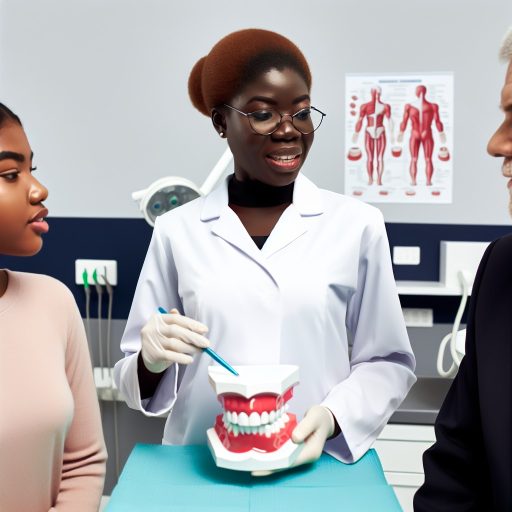Introduction:
Preventive dentistry plays a crucial role in maintaining oral health by focusing on preventive measures.
Bad breath, also known as halitosis, can have a significant impact on one’s overall well-being.
Bad Breath Causes
Bad breath, also known as halitosis, can be caused by several factors.
Poor Oral Hygiene
Not brushing or flossing regularly can lead to the build-up of bacteria in the mouth.
Consuming Certain Foods and Drinks
Foods like garlic, onions, and drinks like coffee can leave a lingering smell in the mouth.
Smoking and Tobacco Use
These habits can not only stain your teeth but also contribute to bad breath.
Medical Conditions
Conditions like dry mouth or sinus infections can also cause bad breath.
It’s essential to address the root cause of bad breath to effectively treat the issue.
Developing good oral hygiene habits is crucial in preventing bad breath.
Regular brushing and flossing help remove food particles and bacteria that cause bad breath.
Visiting your dentist regularly for cleanings and check-ups is also important in maintaining oral health.
In addition to good oral hygiene, watching your diet can also help prevent bad breath.
Limiting the consumption of foods known to cause bad breath can make a significant difference.
Drinking plenty of water throughout the day can help keep your mouth hydrated and reduce bad breath.
Chewing sugar-free gum or mints can also help freshen breath temporarily.
Avoiding tobacco products and smoking can not only improve your breath but also your overall health.
If you suspect that a medical condition is causing your bad breath, consult with your healthcare provider.
They can help diagnose and treat any underlying conditions that may be contributing to the issue.
In some cases, prescription medications may be necessary to manage chronic bad breath.
Remember, maintaining good oral hygiene and addressing any potential underlying causes are key in preventing bad breath.
Importance of Preventive Dentistry:
Regular dental check-ups and cleanings can help detect and prevent issues like bad breath.
Education on proper oral hygiene practices to prevent halitosis is crucial.
Early intervention can help address underlying causes of bad breath before it becomes a major problem.
Preventive dentistry also helps in the prevention of other oral health issues such as cavities and gum disease.
Regular Dental Check-ups and Cleanings:
Visiting your dentist regularly for check-ups and cleanings is essential in maintaining good oral health.
During these visits, your dentist can identify any signs of bad breath and provide appropriate treatment.
Professional cleanings also help remove plaque and bacteria that could be causing bad breath.
By addressing these issues early, you can prevent more severe dental problems in the future.
Education on Proper Oral Hygiene Practices:
Proper oral hygiene is key to preventing bad breath and other oral health issues.
Your dentist can educate you on the best practices for brushing, flossing, and using mouthwash.
They can also recommend oral care products that are effective in combating bad breath.
Following these recommendations diligently can help keep your breath fresh and your mouth healthy.
Early Intervention for Underlying Causes:
Bad breath can be a sign of underlying dental problems such as cavities or gum disease.
Regular dental check-ups can help catch these issues early and prevent them from worsening.
Your dentist can provide treatments to address the root causes of bad breath and improve your oral health.
Early intervention not only helps with bad breath but also prevents more serious complications down the line.
Prevention of Other Oral Health Issues:
Preventive dentistry is not just about addressing bad breath but also preventing other oral health issues.
By maintaining good oral hygiene habits and visiting your dentist regularly, you can prevent cavities and gum disease.
Preventive measures such as fluoride treatments and sealants can further protect your teeth from decay.
Overall, preventive dentistry is essential for keeping your mouth healthy and free from oral health problems.
Transform Your Career with Expert Guidance
Get personalized mentorship consulting that’s tailored to your unique path. Our expert advice is actionable and exclusive.
Get StartedUncover the Details: Eye Care for Children: What Nigerian Parents Should Know
Breathe Fresh by Maintaining Oral Hygiene
When it comes to preventing bad breath, also known as halitosis, there are several key tips to keep in mind.
Brush and Floss Regularly
One of the most important steps in preventing bad breath is to maintain good oral hygiene.
Brush and floss at least twice a day to remove food particles and plaque.
This practice helps reduce bacteria buildup in the mouth.
Use Therapeutic Mouthwash
In addition to brushing and flossing, using a therapeutic mouthwash can help.
A mouthwash with antibacterial ingredients can kill the bacteria that cause bad breath.
Clean Your Tongue
Many people overlook cleaning their tongue.
It can be a breeding ground for bacteria contributing to bad breath.
Use a tongue scraper or the back of your toothbrush to gently clean your tongue.
Stay Hydrated
Drinking plenty of water is essential for good oral health.
Staying hydrated helps wash away odor-causing bacteria.
Avoid Tobacco Products
Smoking and using other tobacco products contribute to bad breath.
They also increase the risk of gum disease and other oral health issues.
If you smoke, consider quitting to improve your breath and overall health.
Eat a Balanced Diet
The foods you eat impact your breath significantly.
Avoid strong-smelling foods like garlic and onions.
Eating a diet rich in fruits and vegetables supports good oral health.
Schedule Regular Dental Check-ups
Regular visits to the dentist are crucial.
Your dentist can identify underlying issues contributing to bad breath.
They can also provide treatment recommendations.
By following these tips for preventing bad breath, you can keep your breath fresh.
Good oral hygiene practices are essential for overall health and well-being!
Discover More: The Future of Restorative Dentistry in Nigeria
Role of Dentists in Addressing Bad Breath:
Dentists play a crucial role in addressing bad breath, also known as halitosis. They are trained to diagnose and treat oral health issues that can lead to unpleasant odors in the mouth.
Here are some key ways in which dentists can help individuals combat bad breath:
- Conducting thorough examinations to identify potential causes of halitosis
- Recommend treatment options such as professional cleanings or treatments for underlying issues
- Providing guidance on proper oral care techniques to prevent bad breath
- Monitoring progress and providing ongoing support for maintaining fresh breath
One of the first steps in addressing bad breath is identifying the underlying causes. Dentists can conduct comprehensive examinations of the mouth, gums, and teeth to look for signs of infection, plaque buildup, or other issues that may contribute to halitosis.
By pinpointing the root cause, dentists can recommend appropriate treatment options to address the problem effectively.
Conducting Thorough Examinations:
Based on the findings from the examination, dentists can recommend various treatment options to combat bad breath. This may include professional cleanings to remove plaque and tartar buildup, as well as treatments for gum disease or tooth decay.
By addressing these underlying issues, dentists can help individuals achieve fresher breath and improve their overall oral health.
Recommendation of Treatment Options:
In addition to providing treatment, dentists can offer guidance on proper oral care techniques to prevent bad breath.
This may include recommendations for brushing and flossing techniques, as well as advice on using mouthwash or other products to freshen breath.
By following these recommendations, individuals can maintain good oral hygiene and reduce the risk of developing halitosis.
Guidance on Proper Oral Care Techniques:
Once treatment has been initiated, dentists can monitor the progress of their patients and provide ongoing support to help maintain fresh breath.
This may involve regular check-ups to assess oral health and make any necessary adjustments to the treatment plan.
By working closely with their patients, dentists can ensure that they continue to enjoy fresh breath and a healthy smile.
Dentists play a vital role in addressing bad breath by identifying the causes, recommending treatment options, offering guidance on oral care techniques, and providing ongoing support for maintaining fresh breath.
By partnering with a dentist, individuals can effectively combat halitosis and achieve optimal oral health.
Discover More: Impact of Climate on Parasitic Diseases in Nigeria

Lifestyle Changes for Fresher Breath:
Making lifestyle changes is crucial in preventing bad breath.
By following these simple steps, you can maintain fresher breath and overall oral health.
Firstly, avoid foods and drinks that can contribute to bad breath.
Certain foods like garlic, onions, and spicy dishes can leave an unpleasant odor in your mouth.
Drinking coffee and alcohol can also contribute to bad breath.
By limiting these items in your diet, you can reduce the chances of experiencing halitosis.
Secondly, quitting smoking and tobacco use is essential in addressing bad breath.
Smoking not only stains your teeth but also dries out your mouth, leading to bad breath.
Tobacco products can also leave a lingering smell that is hard to mask.
By quitting these habits, you can significantly improve the freshness of your breath.
Thirdly, managing medical conditions that may be causing halitosis is crucial.
Conditions like gum disease, sinus infections, and respiratory issues can all lead to bad breath.
It’s important to seek treatment for these conditions to address the root cause of your halitosis.
Lastly, incorporating a balanced diet rich in fruits, vegetables, and whole grains can help combat bad breath.
These foods help promote saliva production, which naturally cleanses the mouth and neutralizes odor-causing bacteria.
A diet high in sugar and processed foods can contribute to halitosis, so opting for healthier options can make a difference in your breath freshness.
Making these lifestyle changes can play a significant role in preventing bad breath.
By being mindful of what you eat, avoiding harmful habits like smoking, addressing underlying medical conditions, and maintaining a healthy diet, you can enjoy fresher breath and better oral health overall.
Start implementing these changes today to see improvements in your breath quality.
- Avoiding foods and drinks that can contribute to bad breath.
- Quitting smoking and tobacco use.
- Managing medical conditions that may be causing halitosis.
- Incorporating a balanced diet rich in fruits, vegetables, and whole grains.
You Might Also Like: Career Opportunities for Dental Therapists in Nigeria
Benefits of Preventive Dentistry for Overall Health:
Preventive dentistry addresses bad breath, or halitosis.
Bad breath can be embarrassing and affect your self-confidence.
It can also impact social interactions and overall quality of life.
- Improving self-confidence and social interactions by addressing bad breath
- Reducing the risk of developing more serious oral health issues
- Enhancing overall well-being and quality of life by maintaining good oral hygiene
- Preventing the need for costly and invasive dental treatments in the future
Firstly, preventive dentistry plays a crucial role in improving self-confidence.
It addresses bad breath effectively.
Having fresh breath can boost your confidence and make you feel at ease.
This improvement enhances your interactions with others.
Secondly, preventive dentistry helps reduce the risk of more serious oral health issues.
Bad breath can indicate underlying dental problems.
These issues may include gum disease, cavities, or oral infections.
By addressing bad breath early on, you can prevent more severe conditions.
Thirdly, maintaining good oral hygiene through preventive dentistry enhances overall well-being.
Fresh breath contributes positively to your sense of well-being.
It can also increase your confidence in personal and professional spheres.
Lastly, preventive dentistry can help you avoid costly dental procedures.
By addressing bad breath, you maintain good oral hygiene.
This proactive approach can help you avoid complex treatments.
Such treatments might include root canals, extractions, or implants.
Avoiding these procedures saves money and supports optimal oral health.
Maintaining Oral Health for Fresh Breath
Addressing bad breath through preventive dentistry is crucial for overall oral health.
Regular dental check-ups and proper oral hygiene practices are key in preventing halitosis.
It is essential for individuals to prioritize their oral health and seek professional guidance if they experience persistent bad breath.
By incorporating preventive measures such as brushing and flossing daily, using mouthwash, and staying hydrated, individuals can effectively combat bad breath.
Additionally, maintaining a balanced diet and avoiding tobacco products can further contribute to fresher breath.
Remember, bad breath can be a sign of underlying dental issues, so it is important not to ignore it.
Seeking professional help from a dentist can help identify and address any oral health concerns that may be causing halitosis.
By practicing good oral hygiene habits, staying consistent with dental visits, and being mindful of lifestyle choices, individuals can effectively prevent and address bad breath.
Take care of your teeth and gums, and enjoy the confidence that comes with fresh breath!
Additional Resources
Emotional and Social Impact of Halitosis on Adolescents and Young …




